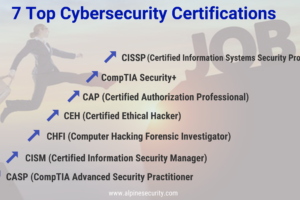Many CISSP training providers advertise high pass rates, such as we have a “99.9% CISSP Certification Exam Pass Rate!”.
This may entice you to consider that CISSP training provider, but their pass rate is really just an estimate. There is no real way for a CISSP training provider to know their pass rate. A person that takes CISSP training is not obligated to share their exam results with the training provider. And, the training provider does not have visibility into exam results. This would be a violation of privacy, confidentiality, etc.
Here’s a scenario I think a lot of people think is true:
-
John Smith takes a CISSP Boot Camp with a CISSP Training provider, such as Alpine Security.
-
John Smith registers with Pearson VUE for the CISSP exam.
-
John Smith takes the CISSP exam at the Pearson VUE testing center.
-
John Smith does not pass the CISSP exam.
-
[FALSE] Pearson VUE contacts Alpine Security, the CISSP training provider where John Smith took his CISSP training, and tells Alpine Security that John Smith failed the exam.
-
[FALSE] Alpine Security enters that John Smith failed the CISSP exam into a master CISSP Pass Rate Dashboard that shows a up-to-minute CISSP pass rate percentage.
Steps 1-4 above are true, the rest are bogus.
This is more like reality:
-
Students X, Y, and Z take a CISSP Boot Camp with a CISSP Training provider, such as Alpine Security.
-
Students X, Y, and Z register with Pearson VUE for the CISSP exam.
-
Students X, Y, and Z take the CISSP exam at the Pearson VUE testing center.
-
Student X and Y pass the CISSP exam.
-
Student Z fails the CISSP exam.
-
Student X emails her trainer from Alpine Security and says she passed the CISSP exam.
-
Student Y intends to email his trainer from Alpine Security, but goes home and celebrates with too many libations and forgets to email his CISSP trainer from Alpine Security.
-
Student Z is embarrassed the he failed the CISSP exam, so he doesn’t tell anyone at all.
Alpine Security knows the following facts:
-
Student X passed the CISSP Exam
-
No response from Students Y and Z
Given this scenario, how do you estimate the pass rate? You can’t say 100% pass rate, but a fair estimate might be to assume:
-
Student Y failed
-
Student Z passed
Based on this assumption, the overall pass rate for this scenario (Students X, Y, and Z) would be 66.7% (2 pass / 3 total). Again, this is just an estimate.
I’m walking you through a couple scenarios so you understand the real challenge determining CISSP pass rates. Also, even if an organization really does have a high pass rate, that doesn’t mean the CISSP candidate will pass the exam. Passing the CISSP is 100% the CISSP candidates responsibility. Yes, the CISSP training provider can help you get ready for the exam through the CISSP boot camp, but it is still up to the candidate to pass, and up to the candidate to tell the CISSP training provider his results.
Conclusion
Take CISSP training provider pass rates with a grain of salt. You’re better off reading legitimate reviews from previous students about their experience, checking about “exam pass guarantees”, and getting a sense if the CISSP training provider is a good fit for you. Best of luck on the CISSP exam!
Author Bio
Christian Espinosa is Alpine Security’s CEO/Founder and a Cybersecurity Professor at Maryville University. He holds over 25 certifications, including the CISSP, CCISO, and PMP. Christian is a US Air Force veteran with a BS in Engineering from the US Air Force Academy and MBA from Webster University. Christian holds multiple patents on cybersecurity attack and defense. Major recent projects include penetration testing and assessments of commercial aircraft, medical device penetration testing, and numerous incident response projects. When Christian isn’t protecting us from cybercriminals, he climbs mountains, travels the world, teaches outdoor wilderness survival, and competes in Ironman triathlons.






